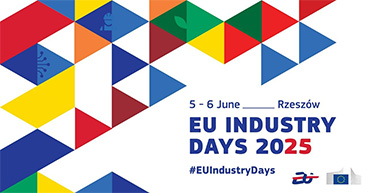The European Confederation of Industrial and Service Cooperatives (CECOP), together with EURATEX and EuroCommerce, organized a session on “Expectations for the European Textile Sector: Balancing Competitiveness and Circularity,” as part of the 2025 Industry Days held on June 5–6 in Rzeszów, Poland.
The event was supported by the Polish Presidency of the Council of the European Union and brought together nearly 1,000 participants, including key representatives of European industry, EU institutional leaders, policymakers, and other stakeholders.
This edition focused on three main themes: Competitiveness and Decarbonisation; An Innovative Industry; and Strengthening Security and Reducing Dependencies in the EU Industry.
The session organized by CECOP was part of the theme “Competitiveness and Decarbonisation”, in the context of the ongoing transformation of the textile industry in Europe, which is striving, on the one hand, to maintain global competitiveness and, on the other hand, to move toward a decarbonised and circular economy.
The Cooperative Textile Sector
During the session, moderated by EURATEX, speakers from RETESSILE — a network of social cooperatives in Italy — and Decathlon discussed the main challenges and opportunities throughout the textile value chain, including waste management, textile recycling, access to raw materials, skills development, and investment needs. They also offered policy recommendations to support the sector’s long-term competitiveness, decarbonisation, and circular transition.
In this context, Giuseppe Finocchiaro, president of RETESSILE, gave an overview of the work done by social cooperatives in Italy in managing textile waste. This network of social cooperatives belongs to the category of type B social cooperatives, and, as the president noted, social inclusion is embedded at all levels. Their mission includes providing employment opportunities to disadvantaged workers while serving as a contact point for cooperation with fashion companies and public administrations.
Solutions to End Waste
Finocchiaro stated that although the revision of the Waste Framework Directive — expected to be debated in the European Parliament’s plenary in October 2025 — mandates the compulsory collection of textile waste, there are no specific funding mechanisms, and the sorting and preparation-for-reuse chain will continue to face pressure.
He also explained that Extended Producer Responsibility (EPR) schemes must not exclude social cooperatives and stressed the need to align the Ecodesign for Sustainable Products Regulation, the Digital Product Passport, and End-of-Waste criteria.
An Unrecognized Contribution
He also highlighted the importance of recognizing that the green transition “is not just a technological issue, but one of power and governance.” He stated: “it is essential that social cooperatives, which are already experts in building traceable and inclusive supply chains, are not left behind.”
The contribution of social cooperatives to circularity in the textile sector often goes unnoticed, despite the enormous effort and results they achieve: in 2024 alone, RETESSILE managed 37,000 tonnes of textiles, as its president recalled. He lamented that “beyond recognition of their efforts, social cooperatives need legal clarity and funding or compensation mechanisms in order to carry out their mission and contribute to building a circular, inclusive, and resilient economy.”







